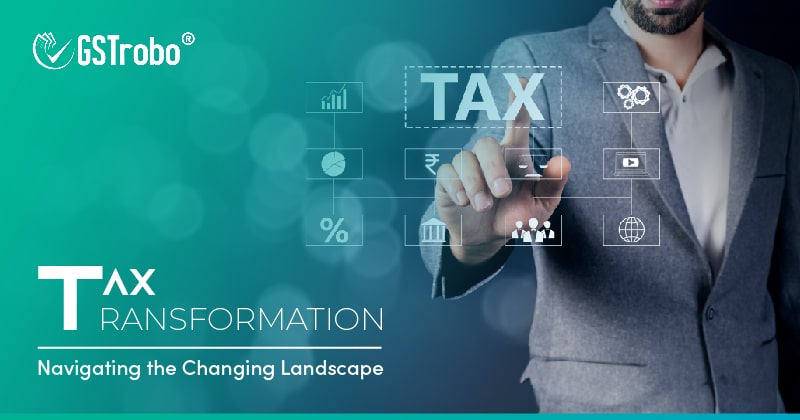Tax Transformation: Navigating the Changing Landscape

What is Tax Transformation?
Tax transformation is the complete modernization of tax systems currently being practiced all around. Modernization is inevitable because of the evolving economic, technological, and regulatory changes. It involves the restructuring of different tax variants, which will result in increased efficiency and adaptability. The goal is to create a tax framework better suited to the changing times and more capable of addressing the needs of taxpayers and tax authorities alike.
Tax transformation is no longer an optional initiative for businesses; it has become an essential and inevitable process in today’s rapidly evolving financial landscape. The traditional tax function, which was once focused on compliance and reporting, is undergoing a fundamental shift to meet the demands of a digitized world.
Reasons making tax transformation inevitable:
Changing Regulatory Norms:
One of the primary forces of tax transformation is the constantly changing regulatory environment. The government continuously introduces new tax regulations, compliance requirements, and reporting standards. Keeping pace with these changes manually can be overwhelming, time-consuming, and prone to error. To remain compliant and avoid penalties, businesses must embrace tax transformation to automate processes, enhance accuracy, and ensure constancy to evolving regulations.
Technological Advancements:
The digital revolution has transformed every aspect of business operations, and tax is no exception. With the emergence of advanced technologies like artificial intelligence, machine learning, and robotic process automation, tax processes can be streamlined and automated, significantly reducing manual efforts. Automation increases efficiency and minimizes the risk of human errors, enabling tax professionals to focus on strategic planning and analysis.
The government is also leveraging technology and strengthening tax enforcement and collection. As a result, businesses are compelled to embrace tax transformation to streamline their tax processes, automate compliance, and leverage digital tools for accurate reporting.
Borderless Globalization:
Globalization and the digital economy have reshaped business operations, cross-border transactions, and revenue generation. Managing tax compliance across multiple jurisdictions with different tax laws, regulations, and reporting requirements is complex and demanding. Businesses operating internationally must comply with the rules of different countries tax systems. In addition, tax authorities are becoming more strict in addressing tax avoidance and ensuring fair practices. Tax transformation allows organizations to effectively manage these challenges, ensuring compliance with international tax laws while optimizing global tax positions.
Data Analytics:
Tax departments possess a wealth of valuable data, but getting meaningful data from this vast pool can only be challenging with the right tools and technologies. Tax transformation empowers businesses to utilize the power of data analytics and advanced reporting tools. By doing so, they can obtain valuable insights into their tax positions, identify opportunities for tax savings, and make decisions based on factual data. Real-time access to this data also enhances transparency and helps create efficiency and transparency within the organization.
Cost Efficiency and Risk Management:
Tax transformation enables organizations to achieve cost efficiency and manage tax-related risks more effectively. Businesses can reduce the administrative burden associated with tax compliance by streamlining processes, automating manual tasks, and adopting tax technology solutions. Streamlined workflows and centralized data depots enable quick access to information, eliminating unnecessary efforts and improving overall efficiency. The financial benefits derived from tax transformation can contribute to overall business growth.
Combat Tax Evasion:
One of the primary objectives of tax transformation is to promote fairness and equity in the tax system. Traditional tax structures often burden the middle class and small businesses, while large corporations and high-net-worth individuals find loopholes to reduce their tax liabilities. Tax transformation seeks to address this impartiality by implementing progressive tax policies, closing loopholes, and combating tax avoidance. Tax transformation can contribute to a more balanced society by ensuring everyone pays their fair share.
Sustainable Development:
Recently, there has been a growing need to connect tax policies with sustainable development targets. Tax transformation can significantly impact promoting sustainability by offering incentives for various environmentally friendly activities, like providing subsidies for investing in renewable energy, green incentives, or implementing carbon pricing systems. By incorporating sustainability into the tax system, governments can help promote businesses to adopt responsible practices and achieve sustainability goals.
Conclusion:
Tax transformation is not merely a choice; hence, upgrading yourself with the upcoming tax transformation is important. The challenges of the digital economy, globalization, and tax imparity require tax systems to evolve and adapt. The government can create a fairer, more efficient, and sustainable tax environment by adopting tax transformation. With the right policies, technology, and international cooperation, tax transformation can foster economic growth and social equality and contribute to a better future for all.
